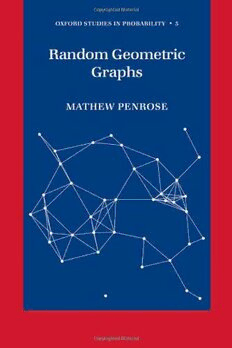
Random geometric graphs PDF
345 Pages·2003·4.846 MB·English
Most books are stored in the elastic cloud where traffic is expensive. For this reason, we have a limit on daily download.
Preview Random geometric graphs
Description:
This monograph provides and explains the mathematics behind geometric graph theory, which studies the properties of a graph that consists of nodes placed in Euclidean space so that edges can be added to connect points that are close to one another. For example, a collection of trees scattered in a forest and the disease that is passed between them, a set of nests of animals or birds on a region and the communication between them or communication between communications stations or nerve cells. Aimed at graduate students and researchers in probability, statistics, combinatorics and graph theory including computer scientists, it covers topics such as: technical tools, edge and component counts, vertex degrees, clique and chromatic number, and connectivity. Applications of this theory are used in the study of neural networks, spread of disease, astrophysics and spatial statistics.
See more
The list of books you might like
Most books are stored in the elastic cloud where traffic is expensive. For this reason, we have a limit on daily download.
